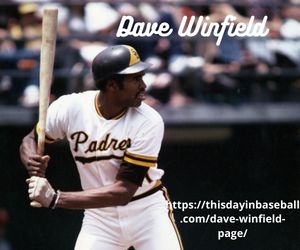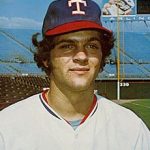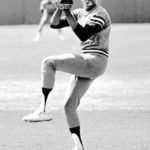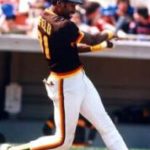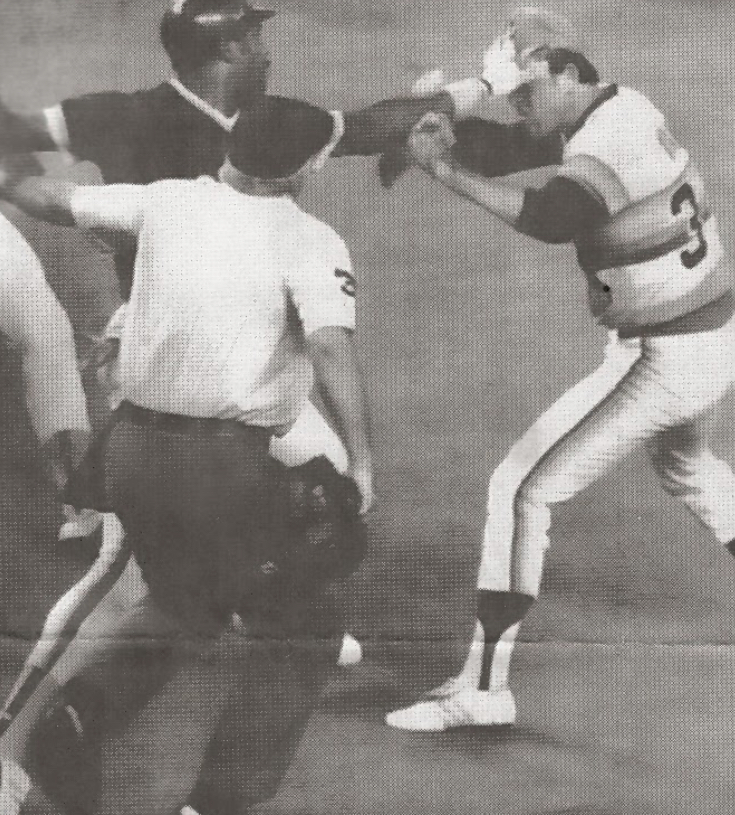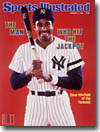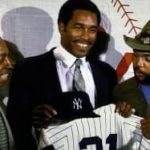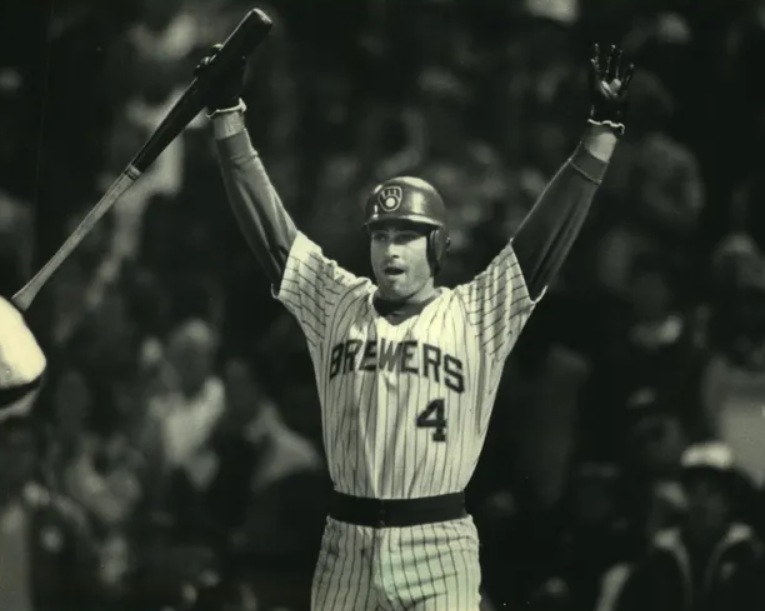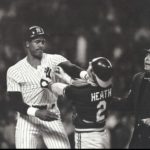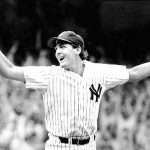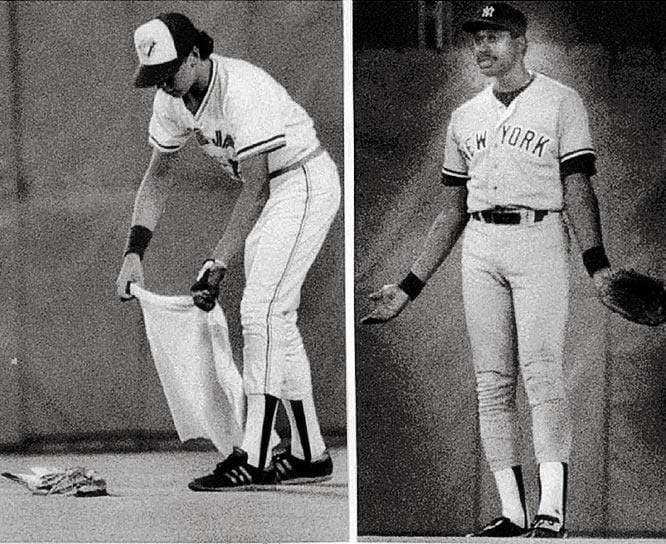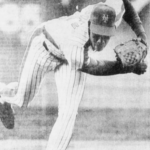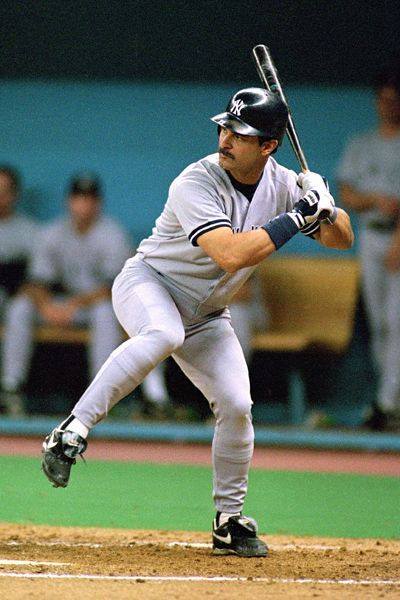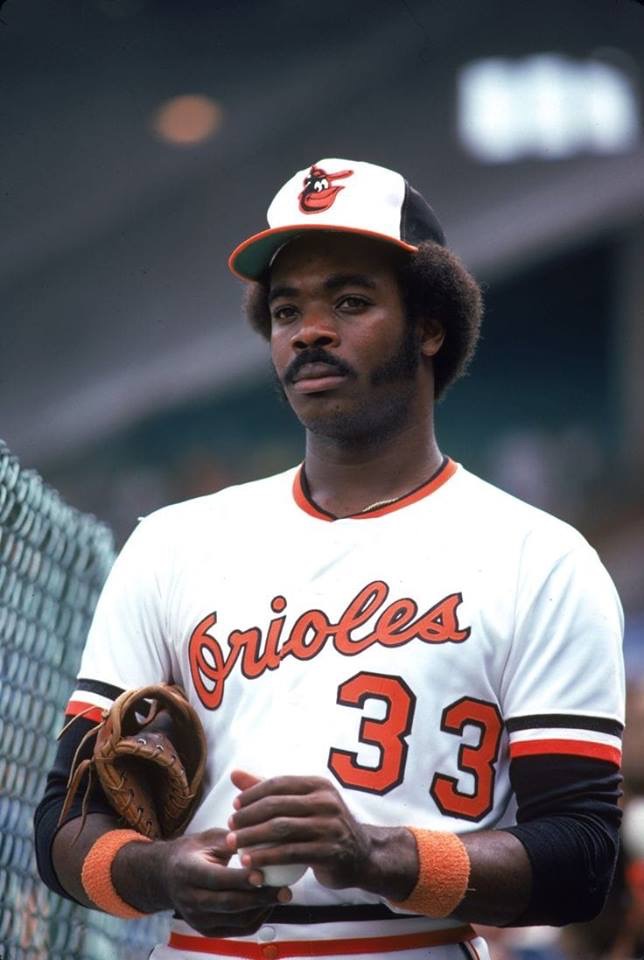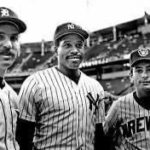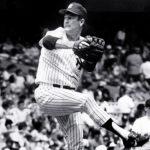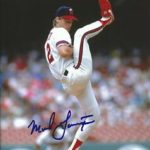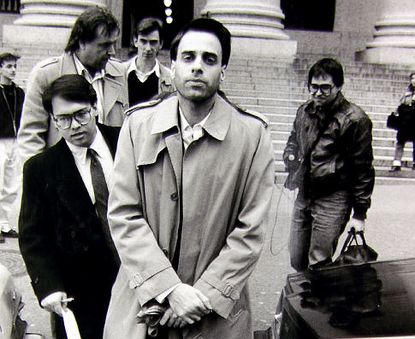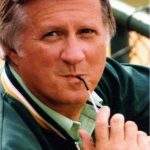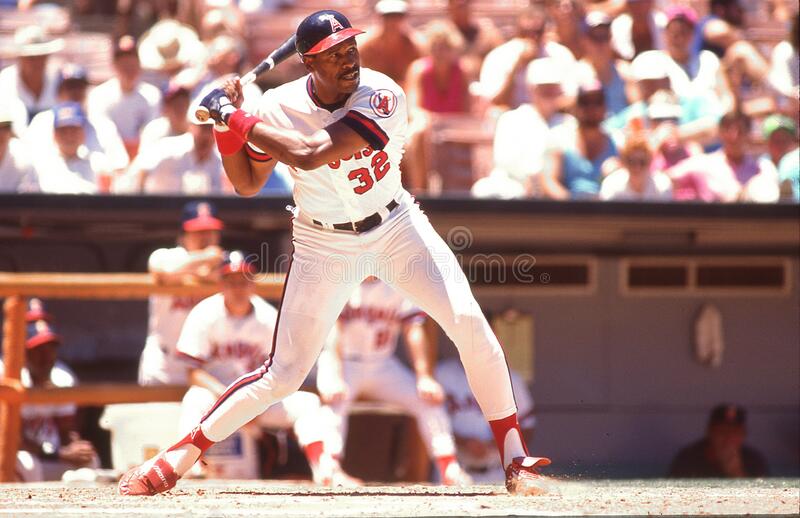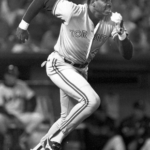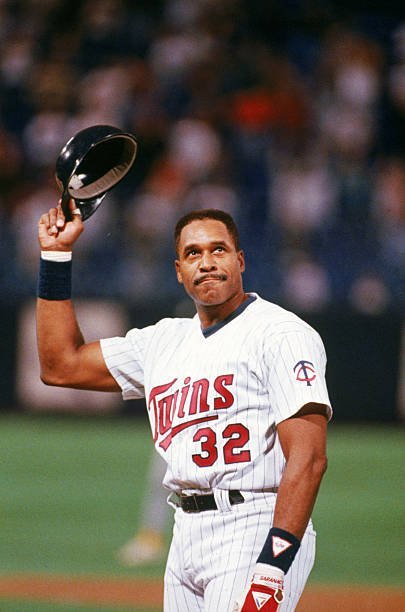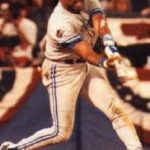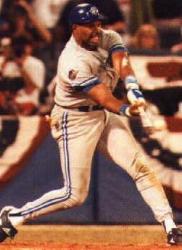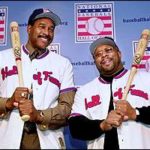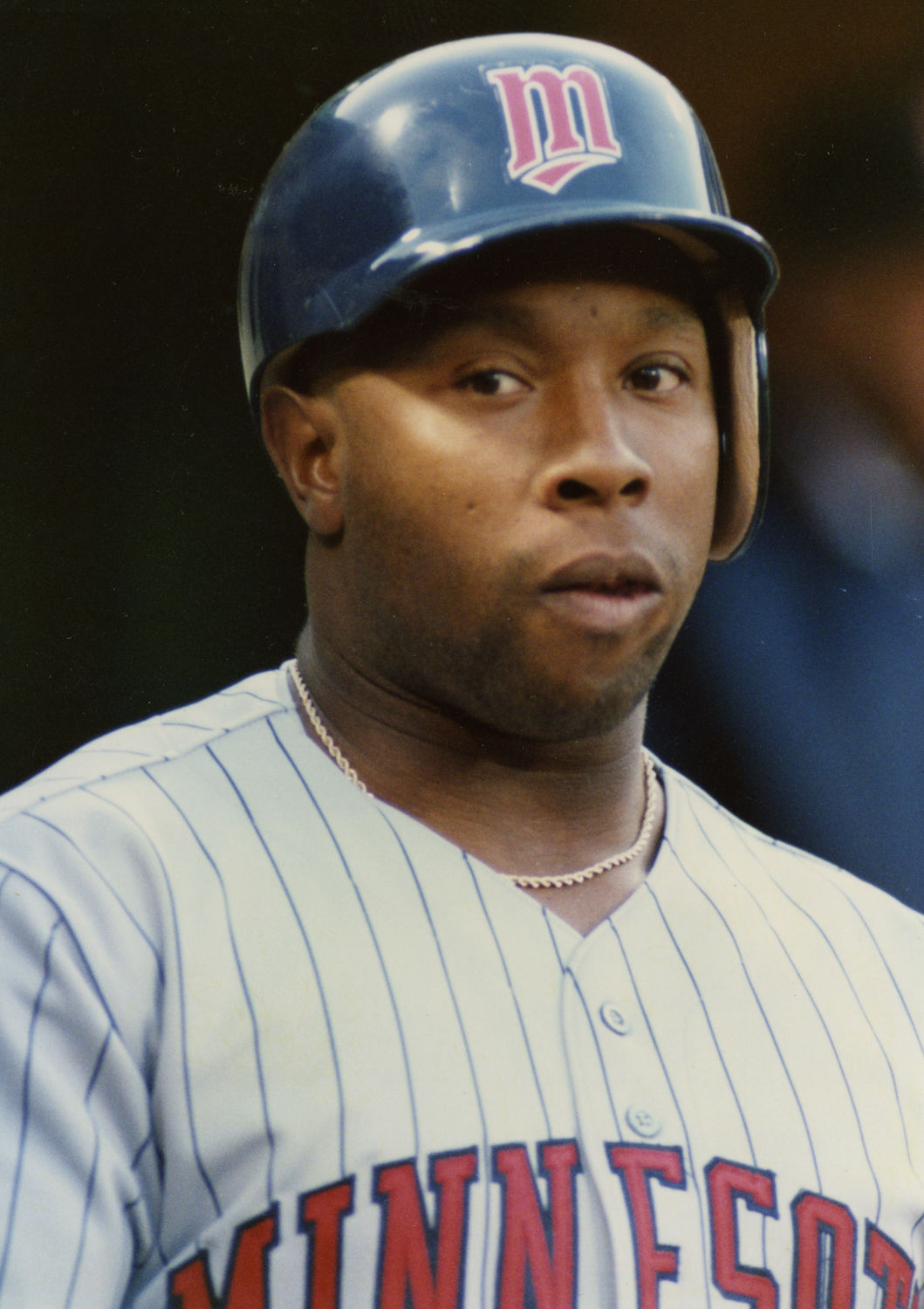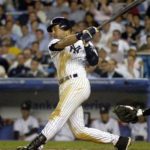Dave Winfield Stats & Facts
Dave Winfield
Position: Rightfielder
Bats: Right • Throws: Right
6-6, 220lb (198cm, 99kg)
Born: October 3, 1951 in St. Paul, MN us
High School: St. Paul Central HS (St. Paul, MN)
School: University of Minnesota (Minneapolis, MN)
Debut: June 19, 1973 (13,380th in major league history)
vs. HOU 4 AB, 1 H, 0 HR, 0 RBI, 0 SB
Last Game: October 1, 1995
vs. KCR 1 AB, 0 H, 0 HR, 0 RBI, 0 SB
Hall of Fame: Inducted as Player in 2001. (Voted by BBWAA on 435/515 ballots)
View Dave Winfield’s Page at the Baseball Hall of Fame (plaque, photos, videos).
Full Name: David Mark Winfield
Nicknames: Winny
Twitter: @DaveWinfieldHOF
View Player Info from the B-R Bullpen
View Player Bio from the SABR BioProject
Baseball HOT ON EBAY
Card Collections ENDING SOON ON EBAY
MOST WANTED ROOKIE CARDS
VINTAGE SPORTS TICKETS
Baseball Hall of Famers
Nine Players Who Debuted in 1973
Dave Winfield
George Brett
Dave Parker
Brian Downing
Frank White
Bill Madlock
Frank Tanana
Steve Rogers
Randy Jones
The Dave Winfield Teammate Team
C: Lance Parrish
1B: Don Mattingly
2B: Roberto Alomar
3B: Graig Nettles
SS: Ozzie Smith
LF: Rickey Henderson
CF: Kirby Puckett
RF: Manny Ramirez
DH: Reggie Jackson
SP: Ron Guidry
SP: Jack Morris
SP: Jim Abbott
SP: Randy Jones
SP: Gaylord Perry
RP: Goose Gossage
RP: Dave Righetti
M: Tom Kelly
Notable Events and Chronology for Dave Winfield Career
Biography
It could be argued that of all the remarkable players enshrined in baseball’s Hall of Fame, none was a more diversely talented athlete than Dave Winfield. A multi-sport star at the University of Minnesota, the sinewy 6-foot-6 Winfield was drafted by the San Diego Padres, the Minnesota Vikings of the NFL, the Atlanta Hawks of the NBA, and the Utah Stars of the ABA. More than 30 years after the fact, it would appear that Winfield made the right choice by sticking with baseball. Over the course of a brilliant 22-year career (and without spending a single day in the minor leagues), Winfield established himself as one of baseball’s most prodigious run producers and premier defenders. A twelve-time All Star and seven-time Gold Glove winner, Winfield is one of only seven players in baseball history with over 3,000 hits and 400 home runs.
While success between the lines may have come naturally to Winfield, his career is as marked by controversy and conflict as it is by on-field heroics. This is especially true of his troubled tenure with the New York Yankees, who made Winfield one of the sport’s first multi-million-dollar superstars by signing him to a ten-year, $23 million contract in 1981. Winfield put up his best numbers while in pinstripes, but it was his regular feuding with querulous owner George Steinbrenner that became the focal point of the New York media’s back pages. After leaving the Yankees under cloudy circumstances in 1990, Winfield resuscitated his career with the California Angels. In 1992, he drove in the deciding runs in the Toronto Blue Jays’ World Series victory over the Atlanta Braves, and the following year he collected his 3,000th hit as a member of his hometown Minnesota Twins.
Although it was Winfield’s hitting that made him a star, it was his powerful throwing arm that first attracted the attention of big league scouts. A star pitcher at the University of Minnesota, Winfield was named All American and was voted College World Series MVP in his senior year. Wishing to utilize Winfield’s bat as well as his arm, the Padres placed him in right field when he broke into the majors in 1973. Winfield put up respectable numbers and developed steadily in his first few years with the Padres, but his breakout year came in 1976, when he earned his first All Star selection by hitting 25 home runs and driving in 92 runs. He was named team captain two years later even though he was still only 26 years old. Winfield went on to break the 100-RBI mark for the first time in 1979 by knocking in 118 runs, en route to earning a third-place finish in the N.L. MVP voting.
After filing for free agency at the conclusion of the 1980 campaign, Winfield was courted by a number of teams. Having spent his first eight seasons with a second-division team, Winfield elected to sign a mammoth ten-year deal with the New York Yankees, who had been to the World Series three times in the previous five years. The signing made Winfield a media sensation in the Big Apple, but the right fielder found himself embroiled in controversy before he even saw his first pitch in pinstripes. Owner George Steinbrenner apparently misinterpreted a flexible cost-of-living clause in Winfield’s contract that brought its total value up to $23 million; Steinbrenner was under the impression that he was signing the outfielder for $7 million less. The contract dispute was settled before spring training began, but the misunderstanding drove a wedge between Winfield and Steinbrenner, and tensions between the two men continued to mount in the years to come.
Shrugging off his off-season troubles, Winfield performed admirably during the 1981 campaign, which was interrupted for almost two months by a players’ strike. Due to the split schedule, a special series was set up at season’s end to determine each division winner. Winfield excelled during New York’s first-round series versus the Milwaukee Brewers, batting .350 to help his team eliminate Milwaukee in five games. However, Winfield failed to experience the same level of success against the Los Angeles Dodgers in the World Series. With stars Reggie Jackson and Graig Nettles out of the lineup due to injuries, Winfield had only one hit in 22 at-bats in the Series, which the Yankees lost to Los Angeles in six games. As a result of his performance that October, he was subsequently characterized by the media as someone who had difficulty performing in key situations.
In the face of this criticism, Winfield bounced back in 1982 with the best offensive season of his career up to that point, finishing the year with 37 home runs and 106 RBIs. He matched those numbers in 1983, but his accomplishments in the batter’s box were overshadowed by a bizarre incident at Toronto’s Exhibition Stadium on August 4th of that year. While warming up between innings, Winfield threw a ball that struck and killed a sea gull that had swooped onto the field of play. Though the incident was clearly an accident, Winfield was relentlessly jeered by the fans in attendance and, much to his surprise, was actually taken into custody by Ontario authorities after the game and charged with animal cruelty. Those charges were dropped the following day, but the episode, along with continued squabbling with Steinbrenner, provided regular fodder for New York’s tabloid press.
As the Yankees continued to fall short of advancing to the postseason throughout the 1980s, Steinbrenner became increasingly famous for taking out his frustrations on a rotating cast of doomed managers. But it was the high-priced Winfield who came to be the main focus of his ire. Following the 1983 season, Steinbrenner carped that Winfield, who had led the Yankee attack with 32 homers and 116 RBIs during the regular season, could not hit for average. Winfield responded by shortening his stroke and increasing his average almost 60 points in 1984. He would have won the battle title that year, were it not for a breakout season by teammate and future MVP Don Mattingly. In a strange echoing of the home run chase that took place between Mickey Mantle and Roger Maris more than 20 years earlier, Winfield and Mattingly battled each other for the batting title the entire summer. On the last day of the season, Mattingly overtook Winfield by going 4-for-5, to win the batting title by a scant .003 points. Just as Yankee fans of the previous generation favored Mantle over Maris during their great home run race, Yankee fans now rooted for the young, home-grown Mattingly over the imported superstar Winfield.
In the face of this ambivalence by the New York media and fan base, Winfield continued to put up numbers that placed him among the game’s greatest sluggers. In 1986, he became the first Yankee since Joe DiMaggio to drive in 100 runs in five consecutive years. However, even though the Yankees won more than 90 games in both 1985 and 1986, they failed to reach the playoffs. Although the Yankees’ inability to advance to the postseason rested squarely on the shoulders of their inadequate pitching, Winfield became a lightning rod for ownership’s frustrations. In an interview with the New York Times, Steinbrenner derisively referred to Winfield as “Mr. May”, a harsh play on Reggie Jackson’s “Mr. October” sobriquet, meant to convey Winfield’s alleged inability to perform in the clutch. For the remainder of the decade, Steinbrenner waged a personal assault against Winfield through the New York media. At one point, the Yankee owner became so obsessed with vilifying his rightfielder that he hired a figure with ties to organized crime to dig up dirt on Winfield. Steinbrenner’s secret machinations against Winfield factored heavily in Major League Baseball’s decision to ban the Yankee owner from baseball in 1990.
After sitting out the entire 1989 season with a back injury, Winfield was traded to the California Angels without his prior knowledge or consent. Winfield, whose major league tenure entitled him to veto such a move, blocked the deal at first, but he ended up accepting the trade. Freed from the distractions that plagued him in New York, Winfield had a bounce back season in 1990 with 19 home runs and 72 RBIs, earning him AL Comeback Player of the Year honors.
In 1992, the 40-year-old Winfield signed with the surging Toronto Blue Jays. Though Winfield had been consistently taunted in Toronto since his sea gull fiasco ten years earlier, he quickly became a popular figure both in the stands and in the clubhouse. He was also a force on the field, finishing fifth in the MVP voting with a .290 average, 26 homers, and 108 RBIs. But it was in the postseason that Winfield really shined. In the eighth inning of the deciding game of the World Series against the Atlanta Braves, Winfield made a diving catch to keep the tying run off base. The Braves eventually tied the game in the ninth, but Winfield broke the deadlock with a two-run double in the 11th inning to give the Blue Jays their first World Series championship.
Following this World Series triumph, Winfield signed with his hometown Minnesota Twins for the 1993 season. He hit 21 home runs that year, setting a record for players over the age of 40. More significantly, he stroked his 3,000th career hit on September 6th in front of a hometown crowd at the Metrodome. He was traded to the Cleveland Indians during the 1994 season, but a player’s strike prevented him from seeing any playing time with his new club. After suffering a rotator cuff injury and missing significant playing time, Winfield decided to retire after the 1995 season.
Dave Winfield was elected to the Baseball Hall of Fame in 2001, in his first year of eligibility. He made the controversial decision to be inducted as a San Diego Padre, in spite of incessant lobbying by his former adversary George Steinbrenner to have him enter Cooperstown in pinstripes. Since his retirement, Winfield has been involved in a number of baseball-related activities, spearheading initiatives to celebrate the game’s history and to honor the achievements of unheralded Negro Leagues players. A well-known philanthropist throughout his career, Winfield continues to fund and promote various charities through his Winfield Foundation.
@ET-DC@eyJkeW5hbWljIjp0cnVlLCJjb250ZW50IjoicG9zdF90YWdzIiwic2V0dGluZ3MiOnsiYmVmb3JlIjoiTGVhcm4gTW9yZSBhYm91dCB0aGUgdGVhbXMsIHBsYXllcnMsIGJhbGwgcGFya3MgYW5kIGV2ZW50cyB0aGF0IGhhcHBlbmVkIG9uIHRoaXMgZGF0ZSBpbiBoaXN0b3J5IC0gLSAtIC0gLSAtIC0gIiwiYWZ0ZXIiOiIiLCJsaW5rX3RvX3Rlcm1fcGFnZSI6Im9uIiwic2VwYXJhdG9yIjoiIHwgIiwiY2F0ZWdvcnlfdHlwZSI6InBvc3RfdGFnIn19@
Factoids, Quotes, Strange Things
Best Season, 1979
This season stands out not because Winfield was as mature as he would be, but rather because he was on a very poor team and excelled. He drove in 118 runs while the Padres scored just 603 times. He batted .308 with 34 homers, 27 doubles, 10 triples, 97 runs, 15 steals, and more walks than strikeouts. He was also the best defensive right fielder in the National League (apologies to Dave Parker).
Awards and Honors
1979 NL Gold Glove
1980 NL Gold Glove
1982 AL Gold Glove
1983 AL Gold Glove
1984 AL Gold Glove
1985 AL Gold Glove
1987 AL Gold Glove
Post-Season Appearances
1981 American League Division Playoffs
1981 American League Championship Series
1981 World Series
1992 American League Championship Series
1992 World Series
Factoid
On June 24, 1991, against the Royals, Dave Winfield became the oldest man to hit for the cycle, at the age of 40.
Where He Played: Right fielder (1,879 games), except in 1981-1983, when the Yanks played him in left, and the last four seasons of his career when he was a DH.
Big League Debut: June 19, 1973
“I had been an American League fan, following the Minnesota Twins. Harmon Killebrew and Zoilo Versalles, they were my guys,” Winfield recalled. “Zoilo [Versalles] because he was a shortstop and pitcher as a kid. The National Leaguers I heard about were Bob Gibson and Willie Mays. Now I was in left field and I didn’t know any of the players. I was just bewildered.”
Notes
When told that he was the leading vote-getter for the 1984 AL All-Star team, Winfield responded, “That’s the way it should be.” … In the late 1970s, Winfield had a clause in his contract with San Diego that he had to be consulted if the team was to be sold.
Hitting Streaks
20 games (1984)
20 games (1984)
Transactions
June 5, 1973: Drafted by the San Diego Padres in the 1st round (4th pick) of the 1973 amateur draft; October 22, 1980: Granted Free Agency; December 15, 1980: Signed as a Free Agent with the New York Yankees; May 11, 1990: Traded by the New York Yankees to the California Angels for Mike Witt; October 30, 1991: Granted Free Agency; December 19, 1991: Signed as a Free Agent with the Toronto Blue Jays; November 2, 1992: Granted Free Agency; December 17, 1992: Signed as a Free Agent with the Minnesota Twins; August 31, 1994: Purchased by the Cleveland Indians from the Minnesota Twins; October 17, 1994: Granted Free Agency; April 5, 1995: Signed as a Free Agent with the Cleveland Indians; November 6, 1995: Granted Free Agency.
In June of 1984, Winfield vetoed a trade that would have sent him from the Yankees to the Texas Rangers for outfielder George Wright, infielder Larry Parrish and pitcher Danny Darwin. By the end of the season he was battling for the AL batting title, but owner George Steinbrenner never forgot Winfield’s trade veto. Winfield said at the time: “The fact that he even thought of trading me shows the kind of mentality which is the reason we’re in the position we’re in now.”
The 1984 American League Batting Race
In 1984, the New York Yankees had two of the best players in baseball: Dave Winfield and Don Mattingly. Winfield was a veteran who had come to New York as a free agent and found it hard to compete with Reggie Jackson for respect. Mattingly was a young player in just his second season, and a fan favorite. That Summer and Fall the two players enjoyed tremendous seasons at the plate and found themselves battling each other for the American League batting title. It proved to be a controversial time in the always tumultuous Yankee organization.
Winfield was no favorite of Yankee owner George Steinbrenner, who felt he had erred in signing the outfielder. In the 1981 post-season Winfield had performed so badly that Steinbrennar took to calling him “Mr. May,” in obvious comparison to Jackson’s status as “Mr. October.” Fans began to turn on Winfield as well, feeling he was overpaid and hadn’t delivered the pennants they had grown accustomed to.
In June of 1984, Steibnrenner tried to deal Winfield to the Texas Rangers for Larry Parrish, Danny Darwin and George Wright, but Winfield vetoed the deal, saying “the fact that he even thought of trading me shows the kind of mentality which is the reason we’re in the position we’re in now.”
Mattingly was a young player who was still making one-tenth the money Winfield was paid. He was accepted by fans as the next in the long line of Yankee heroes. Some even suggested that the fact he was white made it easier for fans to root for him. At least one teammate, Don Baylor, suggested race as a contributing factor to the treatment of Winfield.
As the season wound down to the final day, the batting race was undecided. In the Yankee clubhouse, players tried to stay neutral, but some of the younger players – teammates of Mattingly in the minors – couldn’t help but root for the first baseman. Older players tended to side with Winfield. In the Yankee front office it was no secret who Steinbrenner favored – every effort was made to spotlight the season Mattingly was having.
Winfield added fuel to the fire when he refused to pose for a picture with Mattingly during the chase. “You want to know why I don’t want any part of it? Because they are turning this thing into a racial thing, pitting teammate against teammate, black against white. It’s gotten so they’re even trying to split the clubhouse up on it.”
In the final game at Yankee Stadium against the Detroit Tigers, Mattingly went 4-for-5 and beat out Winfield, .343 to .340. Fans gave Mattingly a standing ovation each time he came to the plate. Winfield was not greeted with the same reception. Mattingly would play for the Yankees for eleven more seasons. Winfield, despite steady production, was let go in the middle of the 1990 season after several battles with Steinbrenner.
Factoid
Dave Winfield played more than 1,100 games for both the Yankees and the Padres. Eddie Collins is the only other player to appear in as many games for two teams.
Winfield vs. New York
Dave Winfield arrived in New York to play for the Yankees in 1981 with a world of expectation on his shoulders. His $23 million contract was the richest in baseball history. He was a great athlete who was coming into his prime years. The Yankees had been to the post-season four of the last five seasons and were primed to win again. “To a certain degree I’m in a no-win situation,” Winfield said, “Even if I were to hit .350 and we didn’t win, I’d hear that I didn’t help the team. I just have to do the best I can and help the team and hope it wins. But this is the most exciting professional year of my life. To play with the Yankees, to show what I can do.”
Ironically, on opening day Winfield had the stage to himself. Yankee star Reggie Jackson remained in Florida recuperating from a calf injury. Thus all eyes were on the new Yankee legend-in-waiting. Would he join Reggie, Mickey Mantle, Joe DiMaggio, Lou Gehrig and Babe Ruth in Yankee glory?
Winfield’s 1981 season suffered from what ailed every player and team that season – the strike. He finished with a decent .294 average, 13 homers and 68 RBI. He also stole 11 bases in 12 attempts. The Yankees benefited from the split-season format and entered the playoffs as winners of the first half. In the Division Series they jumped on top of the Brewers, two games to none, only to be forced to win Game Five to advance. Winfield’s .350 (7-for-20) performance was overshadowed by Jackson’s two homers and four RBI.
In the ALCS and World Series, Winfield went a dismal 3-for-35 (.086) with one extra-base hit and two RBI. The Yankees lost the title to the Dodgers in six games. Owner George Steinbrenner took note of Winfield’s failure and never forgot.
In the off-season Jackson left for California as a free agent and the Yankees truly became Winfield’s team. He was now the “straw that stirred the drink” in the Bronx. He responded with perhaps his finest overall season, slugging .560 with 37 homers (the highest total by a right-handed Yankee hitter since DiMaggio), and 106 RBI in just 140 games. The Yankees, however, finished out of the race, and in what became a pattern, Winfield’s efforts were virtually ignored by the front office.
He followed that season with four more 100-RBI years, the first Yankee to do so since DiMaggio. In 1987 he dipped to 97 RBI before reaching the century-mark again in 1988. Winfield made the All-Star team in every one of his eight full seasons in pinstripes (1981-1988), stretching his streak to 12 seasons.
In 1984 he and teammate Don Mattingly battled for the AL batting crown, a race that lasted until the final day. In more fuel for his fiery days in the Bronx, Mattingly won the title and Winfield’s feelings were hurt when fans failed to give him the ovation his teammate received upon the occasion.
During his eight seasons as a regular in New York, only two players in the AL collected more hits than Winfield (Robin Yount and Eddie Murray). Only Yount and one-time teammate Rickey Henderson scored more runs; only Murray and Dwight Evans hit more homers; only Murray had more total bases; and no player drove in more runners than Winfield over that stretch (812). Despite these accomplishments, Winfield’s time as a Yankee was grueling and controversial.
Almost immediately, Steinbrenner and Winfield butted heads over his contract, which called for cost-of-living increases. Steinbrenner had underestimated the value of the cost-of-living arrangement and refused to pay the fair amount. He ripped Winfield in the newspapers as selfish and claimed he wasn’t the ballplayer Jackson had been. Later the two men would end up in court over alleged missed payments to Winfield’s foundation. The sordid mess resulted in Winfield and Steinbrenner’s refusal to speak to each other.
The Yankee owner took every opportunity to defame Winfield. In 1986 he ordered manager Lou Piniella to platoon Winfield. When Piniella refused, Steinbrenner was furious. More than once, Steinbrenner tried to trade Winfield, but due to his status as a 10-and-5 man (ten seasons in the majors with at least five with his current team), it was impossible. In the Spring of 1988 the Yankees really shopped Winfield, due in large part to his impending autobiography. Steinbrenner had traded Sparky Lyle and Graig Nettles in the seasons their books had been published.
In 1989, Winfield suffered a herniated disc which kept him out of the lineup all season. He returned in 1990 but struggled as a designated hitter. In May he was traded to the Angels, but in typical fashion the deal was controversial, resulting in the commissioner intervening. Winfield ended up in California and earned Comeback Player of the Year honors for his efforts. At last he was free of Steinbrenner, and his days as a Yankee were over.
Quotes About Winfield
“If a fellow can make a fortune somewhere else, let him go ahead.” — Padres owner Ray Kroc on the prospects of signing Dave Winfield, 1980
Quotes From Winfield
“My favorite All-Star memory was when I was selected the second time, playing that game at home in San Diego. The applause at the old Murph, my home park at the time, was thunderous and long. In the All-Star Game, I got a lot of hits, won a lot of games, played with a lot of my idols and became friends. Once you step on the field, you’ve earned it. I would have gone to the All-Star Game any time. I was going to go no matter what.” — Dave Winfield on his favorite All-Star Game memory
Factoid
In 1991, Dave Winfield played in 150 games and turned 40 years old in the last week of the season. Only three other players that old have played that many games in a season: Pete Rose, Honus Wagner and Darrell Evans.
All-Star Selections
1977 NL
1978 NL
1979 NL
1980 NL
1981 AL
1982 AL
1983 AL
1984 AL
1985 AL
1986 AL
1987 AL
1988 AL
Replaced
Cito Gaston, as the Padres’ 1974 right fielder.
Replaced By
His last regular job was as the Twins’ DH in 1994. In ’95, the Twins used Pedro Munoz in that role.
Best Strength as a Player
Athleticism
Largest Weakness as a Player
Despite his game-winning hit in the 1992 Series, Winfield was disappointing in the post-season, hitting .209 with nine RBI in 26 games.

